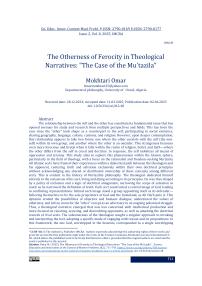The Otherness of Ferocity in Theological Narratives: "The Case of the Mu'tazila"
Автор: Omar M.
Журнал: Science, Education and Innovations in the Context of Modern Problems @imcra
Статья в выпуске: 2 vol.8, 2025 года.
Бесплатный доступ
The relationship between the self and the other has constituted a fundamental issue that has opened avenues for study and research from multiple perspectives and fields. This has been the case since the "other" took shape as a counterpart to the self, participating in social existence, sharing geography, language, culture, customs, and religion. However, upon deeper contemplation, this relationship appears to take two forms: one where the other coexists with the self (the non-self) within its own group, and another where the other is an outsider. This strangeness becomes even more ferocious and brutal when it falls within the realm of religion, belief, and faith—where the other differs from the self in creed and doctrine. In response, the self mobilizes all means of oppression and tyranny. This study aims to explore this phenomenon within the Islamic sphere, particularly in the field of theology, with a focus on the rationalist and freedom-seeking Mu'tazila. All Islamic sects have framed their experiences within a dialectical path between the theologian and his opponent, centering truth and salvation exclusively within their own doctrinal principles without acknowledging any shared or distributed ownership of these concepts among different sects. This is evident in the history of Mu'tazilite philosophy. The theologian dedicated himself entirely to the consensus of his sect, living and dying according to its principles. He was thus shaped by a policy of exclusion and a logic of doctrinal antagonism, narrowing the scope of salvation as much as he narrowed the definition of truth. Each sect constructed a central image of God, leading to conflicting representations: behind each image stood a group appointing itself as its defender—believing themselves to be the sole proprietors of God and the homeland, as Ali Harb puts it. This dynamic eroded the possibilities of objective and humane dialogue, undermined the values of otherness, and left no room for the "other" except as an adversary in an ongoing polemical struggle. Thus, a theological narrative emerged that was less concerned with intellectual production and more focused on rejecting, accusing, and discrediting opponents, as well as attacking the doctrinal records of rival sects. The subconscious of the theologian sought a singular approach to invoking and interpreting the text, adopting a specific mode of engaging with reason and its propositions. In this framework, the one God, worshipped in the heavens, corresponded to a single worshipping sect on earth, embodying the pure doctrine. Plurality was deemed ugly, diversity was condemned, and variety was considered an evil in the religion of the One Lord, the One Creed, the One Messenger, and the One Qur’an. This was the God of the theologians—one whose sternness concealed his smile and whose punishment preceded his mercy. The theologian did not excuse his opponents but rather denied them, refusing to see their differing perspectives as legitimate expressions of diverse visions of truth. Instead, he viewed them as temporary deviations that needed to be marginalized and displaced from their intellectual ground to another.
Theology, Mu'tazila, Otherness, The Other, Takfir
Короткий адрес: https://sciup.org/16010439
IDR: 16010439 | DOI: 10.56334/sei/8.2.48


